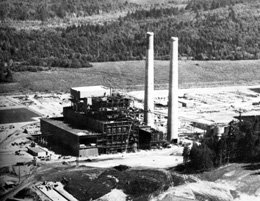On November 27, 2006, the TransAlta open-pit coal mine near Centralia, the last coal mine in Washington, ceases operation. Approximately 550 people are laid off, with their pay and benefits continued for 60 days. The mine was built in the late 1960s to fuel the nearby TransAlta steam-generation electric plant, which will continue to operate with cheaper coal from Montana and Wyoming.
In the nineteenth century, coal was a major product of Washington, with much of the output being sent to Northwest cities as well as to San Francisco and to railroad locomotives. Markets for coal began to decline, particularly following World War I, and by the early 1960s the industry was a shadow of its former self. In Washington electricity was largely produced via water power, but by 1960, all the available hydroelectric sites had been exploited and the state still needed electricity. Utilities turned to nuclear-fired and coal-fired power to meet energy needs.
In the late 1960s, eight utility companies constructed a 1.2 megawatt steam-generation plant next to coal deposits northeast of Centralia. The coal was dug from open pits with immense construction-industry-type equipment, washed, and burned in the generation plant. TransAlta purchased the plant in 2002.
By 2006, the cost of digging and washing the relatively dirty (meaning mixed with impurities) coal at Centralia exceeded the cost of purchasing and transporting cleaner coal from Wyoming and Montana. The owners elected to close the mine. Federal law requires a 60-day notice of major layoffs and the owners decided to cease all work in the mine to avoid accidents due to a workforce distracted by these events. All the employees were kept on full pay and benefits for 60 days. TransAlta was the second largest employer in Lewis County.

